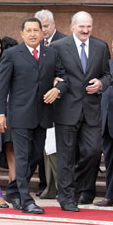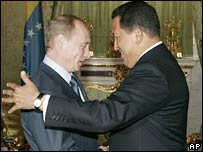Mi Negra è mobile
Katy says: One of the main quibbles I have with the “Mi Negra” scheme that Manuel Rosales is proposing (see Quico’s interesting posts on the subject
here and
here ) has to do with a very un-sexy topic: volatility.
Volatility is just a fancy term for the tendency of Latin American economies to go through repeated boom and bust cycles, with GDP tracking cyclical raw material prices. Volatile economies have volatile inflation rates, and more common currency and banking crises. If all this sounds like the story of your family’s checking account, that’s because Venezuela is an extremely volatile economy.
The problem is that, with Mi Negra, the shocks that originate in international oil markets would be democratised - passed from the trading floors of London and New York straight through to Venezuela's poor households. Is this really a good idea?
A bit of economicsThis graph is from a
working paper by Anoop Singh of the IMF. On the top, you see average GDP growth by region.
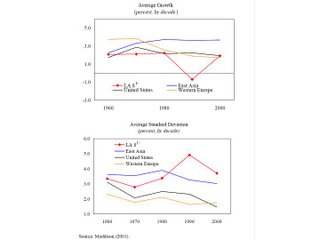
As you can see, Latin America lags other regions in terms of GDP growth. The bottom part shows the standard deviation of growth, in other words, volatility. Not only is Latin America the most volatile of the four regions compared, but also the periods where volatility has been the highest coincide with periods where growth has been the lowest.
The intuition linking high volatility to low growth is straightforward. More volatile economies face more uncertainty, and when uncertainty is high, so is risk. High risk makes financing more difficult and expensive to obtain. And when financing becomes more expensive and scarce, investment lags. Which provides the link to growth: economies that don’t invest enough - on roads and schools, say, or to build factories or bring in new technology - see growth stall.
Much of the volatility in Latin America comes from the ups and downs in government spending. Venezuela is a prime example: when oil prices are high, spending usually soars, and when they fall, down goes public spending with them.
It doesn't have to be that way. Governments have the financial tools at their disposal to help make their economies less volatile. Among them are institutionalised savings instruments like the long-forgotten FIEM. Governments also have access to foreign credit to help make it through low commodity price periods. The sheer financial muscle that governments have can help lessen the risks associated with resource-dependent economies.
But only if they pursue sound, counter-cyclical fiscal policies - which, more often than not, they don't.
Case in point: the current oil boom. With oil prices many times higher than what has been budgeted, the Chavez government is running a deficit this year, mostly because there's an election coming. One shudders to think what would happen if oil prices take a big tumble.
Color de hormigaOne would like to think Rosales has a better solution on offer. But Mi Negra not only doesn't address the problem of volatility, it could make things worse. By transferring a fixed amount of oil revenues directly to poor families, it buffers the government from a portion of oil-cycle volatility, and shifts the risk into the living rooms of poor Venezuelans.
Think about it: when oil prices are high, Venezuelan families would earn, say, 600,000 bolívars per month. If oil prices were to collapse, those same families could see their “Mi Negra” incomes drop to, say, 100,000 bolívars a month: an 83% drop in their income.
Try explaining that to Doña Juanita and Juan Bimba.
Unlike governments, poor families don't have access to the financial instruments or the know-how you need to deal with the risk of a volatile oil market. By bringing oil market volatility into Venezuelan barrio-dwellers' pocketbooks, Mi Negra could severely undermine its own political viability.
So far, nothing Rosales has said suggests they are even thinking about this problem. But they better start, if they want Mi Negra to be politically and financially sustainable in the medium term.
It's a difficult, but not impossible, task. For example, a fixed portion of Mi Negra incomes could be used to fund a real Stabilization Fund, one linked to medium-term oil price trends and designed to force families to save some of their Mi Negra income for bad times or for retirement. That, however, would mean less money up front for poor families, sort of like a big deduction in your paycheck. And we all kind of resent it when our paychecks come with huge deductions, don’t we?
Mi Negra is, in principle, a fine idea, and if implemented correctly it could truly revolutionize Venezuelan society and bring millions out of poverty. But it seems that by proposing an amount up front, they are putting the cart before the horse and setting themselves up for confusion and anger when, later on, they have to explain that the amounts will not be what they'd first trumpeted.
For sure, it's still early in the campaign, and I'm sure the Rosales camp will publish more details on Mi Negra in the coming weeks. As they draft those, they should realize that, if Mi Negra doesn't incorporate some mechanism to mitigate the oil market's inherent volatility, it could do more harm than good.
Please comment responsibly:
|
Selling guns to FARC? Moi?
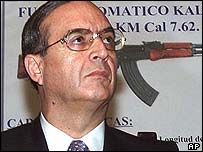
A blast from the past: Vladimiro Montesinos, the one-time power-behind-the-Fujimori-throne in Perú,
has been convicted to 20 years in jail for secretly selling 10,000 guns to Colombia's main communist guerrilla, FARC. Montesinos, you may recall, spent the better part of a year hiding out in Venezuela directly after the Fujimori regime collapsed. With very evident high-level support, Montesinos was personally guarded by two DISIP (intelligence police) agents - Rolando and Otoniel Guevara, now in jail for the murder of Danilo Anderson. Their involvement in the Montesinos cover-up was flushed out by opposition journalist Patricia Poleo, who was later - bizarrely - accused of conspiring
with them to murder Anderson. (If you find all this impossibly confusing, you are in, erm, ample company.)
The point? Put him in hands of independent investigators, and JVR's secret buddy - and, one can't help but suspect, role model - it turns out he was arming FARC. (Plus, remember, Montesinos was nominally right-wing.) So, when we fret that Venezuela's Kalashnikov purchases are going to end up in narcoguerrilla hands, are we paranoid, or merely realistic?
Please comment responsibly:
|
Would you hand over power to Satan?
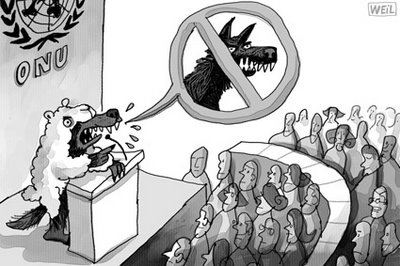
Five years ago, when I started writing about Chávez's strategy to "demonize" his political enemies, I never imagined the guy would
get literal on my ass.But today, having seen Chávez take his remarkable
ad hominem rant calling Bush, literally, "the devil", to the most public forum on the planet, we can only revisit longstanding questions about the Chavez's democratic
bona fides. Dissent is the work of the devilI've always interpreted Chavez's highly personal attacks on his opponents (whether puntofijistas or gringo imperialists) as part of a broader strategy aimed at delegitimating dissent. His discourse implicitly rejects dissenter's right to vie for power.
Within Chavez's political imagination, the problem with those who disagree with him is not that they are wrong but that they are evil. This is why he has always replied to opposition arguments not with reasoned rebuttals but with personal attacks.
Because, when it comes down to it, I can have a debate with someone I disagree with. I can share the nation's public institutions with someone who is merely wrong. But I cannot allow pure evil a role in public life. I have a duty to stop it, by any means at my disposal.
Satan's minionNow, Chavez has been very explicit in this election cycle. In his fantasy ideology, Manuel Rosales is just George W. Bush's stooge. It's not surprising that Chavez takes this line, since for years his standard operating procedure has been to blame any and every problem he, Venezuela, or the world has to the US, and to dismiss all who disagree with him as US stooges.
The new twist is that, having equated Bush with the devil, Chavez is now arguing that Rosales is, in effect, an agent of Satan. A purveyor of pure evil. Now, lets take this line of argument seriously for a moment, and work through its implications.
If you truly see the world in those terms, don't you have a duty to make absolutely sure that the devil does not get into power? Aren't you duty-bound to do whatever it takes to prevent that? Doesn't election fraud become a patriotic obligation if the alternative is to hand your nation's reins over to beelzebub?
Justified skepticismUnless we dismiss Chavez's rhetoric as mere
paja, we have to believe that Chavez sees stealing an election - if need be - as a kind of moral imperative. A dirty job, perhaps a sordid one, but certainly a much lesser evil than the alternative.
In the end, it's Chavez's caricaturish manicheanism that feeds opposition skepticism about whether the guy would ever hand over power if he lost an election. Such skepticism is neither paranoid nor unreasonable: it flows directly from the content of Chavez's discourse. It's the only reasonable conclusion you can come to if you take the guy seriously.
Because Chavez's radical repudiation of the legitimacy of disagreeing with him - shown, again, in
JVR's tacit approval of violence against Rosales campaign events - is fundamentally incompatible with democratic alternation.
I can alternate in power with my opponents only if I see political differences as normal, as a result of human beings' natural tendency to have different views on any given subject. But I cannot alternate in power if I think that political differences are the result of the fact that I am good and my opponents are Satan spawn.
Which is why even those of us who are convinced that a debate about CNE's rectitude is futile can't help but think twice about it when we hear Chavez talk this way.
Please comment responsibly:
|
¿Quién es más golpista?
Recently, we've found that chavistas are shocked,
shocked that somebody who has actually participated in a coup attempt might think he's fit to be president. Will wonders never cease?
Seriously, though, how do Rosales and Chávez stack up in the old coup-o-meter?
| Rosales | Chávez |
|---|
| Signed a document to certify he attended a ceremony that went on to endorse a coup against an elected government. | Spent over 10 years leading the planning, organization and promotion of a coup against an elected government. |
| Sat in an audience lending tacit support to a plan to shut down all of the nation's democratic institutions. | Drafted a plan to shut down all of the nation's democratic institutions. |
| Apologized for his participation in a coup attempt. | Repeatedly celebrates and brags about his participation in a coup attempt. |
| Was a bit player in a coup where the army took power without firing a shot. | Organized and led a guns-a-blazin' putsch that left dozens dead. |
Please comment responsibly:
|
10 million votes ... $600 million
Katy says: I thought this
article from the Jamestown Foundation's Eurasia Group on the arms deals between Chávez and Russia was interesting. According to the author, the planes Chávez is buying are second-hand, overpriced and pretty useless; useless, that is, unless you're trying to buy your way into the UN Security Council and need cash to be re-elected in your own country at the same time.
What astounded me was the figure for the alleged kickbacks in this deal: $600 million is a lot of change.
Please comment responsibly:
|
Hinterlaces: Chávez 48% - Rosales 30%
Hinterlaces, the polling firm run by Caracas political oracle Oscar Schemel, has just released its
beginning of September poll, showing Chávez falling below 50% for the first time, Rosales at 30%, and a large chunk of undecideds (20%.)
As always, given Schemel's methodology, Hinterlaces identifies a huge chunk of the electorate as "Ni Nis" - politically unalligned people who tend to have mixed feelings about Chávez but are highly critical of the opposition political class. Schemel places the group at a startling 46% of the electorate just 3 months before the vote.
How does Rosales win over this key group? By engineering his own
Sister Souljah moment, to symbolically distance himself from the oppo old guard. Thing is, that's hard to do when you've appointed Sister Souljah to your campaign command...
Please comment responsibly:
|
Can Mi Negra lead to sustained economic growth?
Yesterday, I dealt with some of the Social Policy questions raised by Rosales' proposal to hand out a debit card to millions of poor families in order to distribute oil rents. Today, I want to deal with some of the development economics of the proposal.
First off, lets be honest here: Mi Negra is basically about electoral politics, not about development strategy. Given the pressures of the moment, that's understandable. But the question still bears asking: Can Mi Negra help foster and sustain economic growth?
To answer that, it's important to get back to basics. Probably the most fundamental choice all economic actors make, day in and day out, is whether to consume now or to consume later. To spend or to save? That is the question...
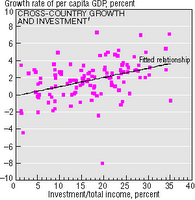
There is good empirical evidence showing that countries that save more and consume less grow more quickly over the long term.
As I've argued before, this is really a tautology: just a fancy way of saying that, on average, countries that choose to consume less now in order to consume more in the future actually do consume more in the future.
So, from a long term growth perspective, the most important question facing Mi Negra is what it will do to Venezuela's savings and investment rates. If Mi Negra leads to more saving and more investment, it will be a net asset to Venezuela's long term growth. If the bulk of the money handed out is consumed right away, it will not help the country grow faster in the long term.
Now, conventional wisdom has it that poor people in Venezuela can't afford to save: they're too economically pressed to favor a little more consumption later over a little less consumption now. Economists would say their "marginal propensity to consume" is very high. Which is neither surprising nor irrational. If I am hungry now, of course I would rather eat 1 arepa today than 1.06 arepas in a year's time.
But the story is more complicated than that. Part of the appeal of Mi Negra is that it would bring a huge mass of new customers into Venezuela's financial system. If you're going to issue people a debit card, you will also have to issue them bank accounts to deposit the money they are going to debit. Mi Negra would vastly expand the client base of Venezuela's banking system. Given that, if clients do nothing, the default option is for money to just accumulate in their accounts, their marginal propensity to consume may be lower under Mi Negra than is usually realized.
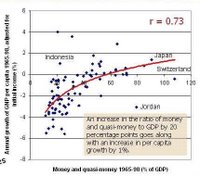
This is important because a healthy financial system is a key mechanism linking higher savings rates to faster growth. Economists have good evidence to show that financial deepening leads to faster growth.
But as
some recent research indicates, Venezuela's financial sector has shrunk along with the rest of the economy in the last 30 years. Today, it's one of the smallest and weakest in the world relative to the size of the country's economy.
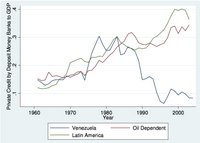
UCLA researcher Matías Braun notes that, in Venezuela, "bank credit to the private sector amounts to just around 9% of GDP, ranking the country in position 132 out of the 157 countries where the figure is available for the 2000s." If Mi Negra helps to raise that number, it would brighten Venezuela's long-term growth prospects considerably.
So I think the picture is inconclusive. While handing out money to poor people may seem like an odd way of raising saving and investment rates, handing out bank accounts to poor people is an excellent way of doing so. Certainly, it's a far more promising option than the chavista method, which relies on handing out cash to political supporters without involving the financial sector at all.
Some people surrounding Rosales are already busy trying to include some sort of mandatory savings element into "Mi Negra." From a development strategy standpoint, this is all well and good because, hell, anything that reduces people's marginal propensity to consume is all well and good from a long term growth perspective. But, of course, any such proposal dilutes Mi Negra's vote-getting appeal: it's much harder to pander for votes with some abstract, hard-to-understand pledge that mandatory pension contributions will be made on your behalf than with promises of free money now.
Please comment responsibly:
|
Mi Negra: A good idea that's being oversold
Manuel Rosales has made
two headline proposals during his campaign:
A-A pledge to pay the unemployed a minimum wage.
B-"Mi Negra" - a plan to issue lower and middle class people a debit card to distribute 30% of the nation's oil revenues directly into people's pockets, in payments that would range between Bs.600,000 and Bs.1 million per family per month.
One problem is that the relationship between the two pledges is murky - I for one have not seen a detailed proposal - so it's not so clear if the money for A is supposed to come from the same 30% of oil revenues that will fund B.
I have argued elsewhere that Pledge A is
just absurd. I don't think I need to spend any more space on it here.
Mi Negra, however, is not absurd. In fact, conceptually, it's very appealing: it would break the petrostate model at the root, by transcending the oil-money-for-political-support
quid pro quo that is the crux of petro-populism. Conceptually, I like it a lot.
My problem is that the proposal lacks detail, so I'm reduced to doing back of the envelope calculations to try to say something about its viability. What I find is that the only way Rosales can deliver payouts of Bs.600,000 - Bs.1 million per family is to leave millions of poor families out of the program. But any attempt to make Mi Negra highly selective would bring very serious problems of its own.
Tallying up Mi NegraGranted, everything that follows depends, needless to say, on the assumptions you make. But a quick-and-dirty calculation of Mi Negra's viability might go like this:
Assume Venezuelan oil exports fetch $38/barrel, we export 2.2 million barrels per day, and production costs hover around $8/barrel. Then, 30% of export earnings works out to:
$30 per barrel x 2.2 million export barrels x 365 days x 0.3 = $7.2 billion/yearNow, consider that nearly everyone in Venezuela is either poor or near-poor. The per-capita figure, then, is:
$7.2 billion / 25 million = $289 per person per year. Assuming a standard 5-person household, the per family per month pay out would be:
$289 x 5 people x 2,150 Bs:$ / 12 months = Bs.258,000 per family per month. That's less than half the Bs.600,000 Rosales is touting as his bottom-of-the-range estimate. Even if you chose to limit payments to just half of Venezuela's families, you'd still come up short.
Even when oil prices are very high - like now - the numbers don't really seem to work.
In 2006, for instance,
VenEconomy estimates that PDVSA's total fiscal contribution will come to Bs.80 trillion, a hefty $37.5 billion.
30% of $37.5 billion comes to $11.2 billion. So at a time of sky-high oil prices, the amount to be handed out via Mi Negra comes to:
$11.2 bn / 5 million families / 12 months x 2,150 Bs:$ = Bs.400,000 per household per month.Which is still one third short of Rosales's pledge of Bs.600,000 minimum.
The Perils of SelectivityNow, the obvious solution here is to introduce stricter selectivity, giving money out to the poorer half of the population only.
Parts of Rosales' website suggest this is the plan. The sum would then be:
$11.2 bn / 2.5 million families / 12 months x 2,150 Bs:$ = Bs.800,000 per family per month.Selectivity is an intuitively appealing solution, but one with serious practical problems. One is that, these days, the Venezuelan middle class is so small that excluding half the population means shutting millions of poor families out of the system.
A bigger problem is that the moment you introduce selectivity, you introduce
perverse incentives.Families with incomes just below the (by nature arbitrary) threshold would pocket the Mi Negra money and leapfrog ahead of families with incomes just above the threshold. The leapfrogged families will not take this sitting down.
They will have a strong (perverse) incentive to either hide their income from the authorities - easy, given the scale of the informal economy - or to work less so they qualify for Mi Negra. As more and more families do this, the average payout from the system would tend to fall.
What's more, it's easy to foresee that whatever government agency is charged with deciding who is above and who is below the Mi Negra threshold would have a strong tendency to become corrupt. The more selective the program is, the more bureaucrats you need to run it. And bureaucrats given discretion over decisions worth hundreds of dollars to millions of people are very well positioned to pocket a cut.
But isn't Rosales selling Mi Negra as the simple, non-bureaucratic alternative to oil rent redistribution?
In the worst case scenario, Mi Negra could come to be used as a new mechanism for Petrostate populism, where loyal Rosalistas get the subsidy and his opponents do not. And, well,
cabra tira pa'l monte - given Rosales' roots in the AD petro-populist system, I don't think it's crazy to think Mi Negra could degenerate along those lines.
So selectivity is costly on a number of levels, and could end up subverting the whole point of the system.
I think Mi Negra is a laudable idea, but the devil is definitely in the detail. A less selective program would be far simpler and cleaner, but it would offer substantially less money to each recipient family. To make the program more generous you have to make it more selective, but then you create layers of perverse incentives and run the risk of creating a bureaucratic monster. Hard choices have to be made here - there is no magic bullet.
Please comment responsibly:
|
First Reasonably Reliable Poll: En el lugar de siempre y con la misma gente...
Well, finally some numbers. At the start of the campaign, it's Chavez 50%, Rosales 37%.
At least that is the headline figure for
this Penn, Schoen & Berland poll conducted by DATOS for Rosales' campaign.Methodological quibbles aside - and I have a few of those - the thing this poll finds is what I'd suspected all along: Rosales has the support of the traditional anti-Chavez block, and that's it. In fact, his 37% is basically not far from
the 40% Salas Romer got in 1998, and
the 37.5% Arias Cardenas got in 2000. Rosales has a strategy to target class C and D voters; he understands he has to broaden his support beyond the antichavista heartland to have a fighting chance in December. It is early days, and his plan could imaginably work. But his decision to surround himself with as many visible heads of the oppo political class as he could find rather than making a symbolic break with them seems like an odd way of pandering to NiNis and Transactional Chavistas.
At this stage all I can say is, well, how does
that song go?
Por eso aún estoy
en el lugar de siempre
en la misma ciudad
y con la misma gente...So what do I make of all this?Note to the Rosales campaign staff who - rumor has it - sometimes read CC: PLEASE prove me wrong. I think Rosales' chances are not good. Having done the easy part - coalescing the Anyone But Chavez camp around him - he faces the much tougher job of pulling in the Politically Homeless Ni Ni-voters and the Transactional Chavistas who will decide the election. "Mi Negra" is clearly an attempt to do that - but can it work, if he ties himself so closely to an oppo establishment NiNis and Transactionals detest?
If he plays his populism right, I think Rosales could imaginably pull off an upset. Just imaginably. But only if he gets an awful lot of help from Chavez.
How? Well, if Chavez persists on centering his discourse on foreign affairs, keeps talking obsessively about his grand plans to save the human race, then it's possible that even a candidate with Rosales' limitations could win. His discourse, however artlessly delivered, is at least relevant to normal Venezuelans everyday problems - more and more, Chavez's is not.
Chavez's legendary knack for electioneering, his political sixth sense, would have to melt down comprehensibly under the weight of his own megalomania for this to happen, though. The guy has always been, at heart, a pragmatist, and I would be very surprised if he does not pull back from the brink and retreat to tried-and-true populist themes when it becomes clear that his internationalist agenda leaves most Venezuelans cold. That, together with the essentially-bottomless-barrel-of-cash at his disposal, should be enough to put him over the top.
The question, for the Nth time, is: just how crazy is Chavez?
Loco es el que come mierda, they say. So is he? We shall find out...
Please comment responsibly:
|






 Chavez Reelection Blog: Katy documents the government's use of public resources for Chavez's partisan advantage.
Chavez Reelection Blog: Katy documents the government's use of public resources for Chavez's partisan advantage.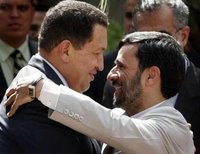

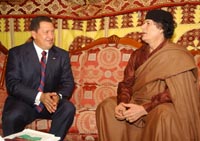

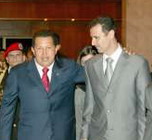
 Site feed
Site feed 